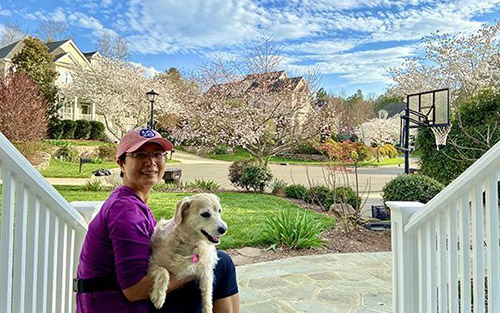Publisher's note: The author of this post, Natalie Sayewich, is a contributor to ECU News Services.
Stress among health care providers is common, and burnout can affect the quality of care thatís provided to patients. A pair of new studies out of East Carolina University could help health care professionals mitigate burnout in the difficult months ahead. | Photo: Rhett Butler | Video: Rich Klindworth
As we navigate the COVID-19 pandemic, doctors, nurses and other health care providers are being faced with unprecedented challenges, including shortages of staff and equipment needed to provide care to patients, fears about their own safety and that of their families, and new challenges at home such as home-schooling their children.
Studies show that physicians and nurses who report signs and symptoms of burnout are more concerned about making medical errors, and higher levels of burnout in nurses are correlated with lower ratings of patient care quality. Physician stress
was declared a public health crisis even before the first case of COVID-19 was reported.
A pair of new studies out of East Carolina University could help health care professionals mitigate burnout in the difficult months ahead.
A new study authored by
ECU College of Nursing faculty member
Dr. Holly Wei and collaborators looked explicitly at nurses caring for COVID-19 patients in Hubei province, China, at the beginning of the pandemic's breakout. The study provides guidance for nurse leaders to help nurses adjust psychologically to the demands of serving on the front lines of the pandemic.
Dr. Holly Wei, associate professor at the ECU College of Nursing, said she draws energy from connecting with family and friends, spending time outdoors, hiking and observing the development of plants in nature. | Photo: Contributed
The study — recently accepted for publication in "Issues in Mental Health Nursing" — showed that nurses on the front lines of the pandemic go through psychological stages when caring for patients with COVID-19. These stages include ambivalence, emotional exhaustion and energy-renewal. Nurse leaders are instrumental in aiding these nurses' psychological adaptation by identifying negative psychological changes, providing support and fostering resilience.
At the same time, Dr. Wei and colleagues also had a literature review published in "Nurse Leader" about the impact of leadership styles on nurse burnout. Both the study and literature review show that nurse leaders play a significant role in establishing a supportive work environment, providing the equipment required and meeting the emotional needs of nurses.
Wei added,
"Nurses in the front lines are like warriors in the war. While there might not be visible bullets going through, they are fighting the invisible virus. They need both physical and psychological armors, which leaders of all levels should provide."
In another study -
"Self-care Strategies to Combat Burnout Among Pediatric Critical Care Nurses and Physicians," which was recently published in the academic journal "Critical Care Nurse" - Wei and her co-authors identified the following six strategies to help health care professionals avoid burnout:
Find meaning in your work
Finding meaning in one's work was the strategy cited most by the nurses and physicians who participated in the study. Wei advises that remembering one's initial sense of purpose can help motivate health care providers and remind them about the passion they have for their work. One nurse quoted in the study said,
"Taking care of others makes me feel that I am doing something meaningful. I am involving myself in something for the greater good."
Connect with an energy source
It's crucial to recognize the aspects of your life and career that give you energy, and to return to those energy sources regularly, Wei said. Some nurses and physicians reported spiritual practices such as prayer served as a source of energy. Wei said she draws energy from connecting with family and friends, spending time outdoors, hiking and observing the development of plants in nature.
"One cannot serve from an empty vessel," Wei said.
"We all need to have the energy to serve. Each of us has a way to recharge. We need to find the right one to replenish our energy."
Several of the health providers cited in the study pointed to providing high-quality patient care as an energy source, which can be good when patient health is good, but can put providers at risk of burnout if their patients aren't progressing, Wei said.
Nurture interpersonal connections
Regularly connecting with colleagues and leadership teams and nurturing these relationships were
"fundamental to creating a caring and healing environment and reducing work-related stress," the study found. Seventy percent of health care providers surveyed relayed the importance of their workplace relationships. Some participants also noted how helpful it was when leadership offered support and opportunities for breaks.
"Nurturing a pleasant interpersonal relationship with others can not only elevate one's own happiness, but also brighten the mood of the people around him or her," Wei said.
"Acts of kindness to self and others can improve one's satisfaction and happiness."
Develop an attitude of positivity
More than half of nurses and physicians surveyed shared that developing a strategy of focusing on the positives of their work was helpful in avoiding burnout. One nurse contributed, "While some days were demanding and emotionally distressing, I found a way to position myself to face the challenges by seeing the good in the overall picture. I keep a gratitude journal to count my blessings."
"If we only focus on the negative, we miss all the positive things," Wei said.
"So, we need to train our brain to see the positive. If something didn't go right, we can think about the positive things that we can learn from it."
Make 'emotional hygiene' a priority
Wei said that performing what she refers to as emotional hygiene could help health care providers build resilience and thus, reduce the risk of burnout. Strategies cited by participants as important included self-reflecting, praying, spending time with family and friends, setting boundaries between home and work, practicing mindfulness and making adequate sleep and moderate exercise a priority.
"What I do to recover emotionally is to set boundaries and maintain a work-life balance," one physician said in the study.
"I try to separate myself from work when I am home. When I leave work, I don't look at work emails."
Recognize our unique abilities and contributions
Remember the contributions that you are uniquely able to provide to your patients and team at work, Wei advised. Nurses and physicians pointed out that health care is like a team sport in which each member provides valuable contributions that others cannot. Likewise, it is similarly important to recognize each other's contributions to the team.
"Teamwork starts with the recognition of the expertise and limitations of each team member," one physician said.
"It takes a whole team to win a game, which, in health care, is patient safety and quality care."


